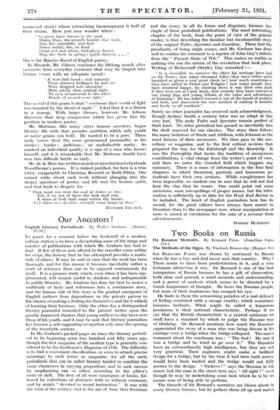Our Ancestors !
To pause for a moment before the bookstall of a modern railway station is to have a devastating sense of the range and number of publications with which Mr. Graham has had to deal. If few of those now offered to the traveller come within his scope, the history that he has attempted provides a multi- tude of others. It may be said at once that the work has been thorough, and for this reason it becomes inevitably rather a work of reference than one to be enjoyed continuously for itself. It is a pioneer study which, even when it has been sup- plemented, will remain useful to students and indispensable to public libraries. Mr. Graham has done Isis best to weave a multitude of facts and references into a continuous story, and the human side of this story is the gradual emergence of English authors from dependence on the private patron to the chance of making a footing for themselves and (be it added) of learning their business. Only the other day a distinguished literary journalist remarked to the present writer upon the greatly improved chances that young authors to-day have over those of his youth, and it may be said that literary journalism has become a self-supporting occupation only since the opening of the twentieth century.
In Mr. Graham's packed pages we trace the literary periodi- cal to its beginning some two hundred and fifty years ago, though the first magazine of the modern type is generally con- sidered to be the Gentleman's Magazine of 1731. The difficulty is to find a convenient classification, or even to attach precise meanings to such terms as magazine, for all the early periodicals that can be called literary tended to combine the same characters in varying proportions and to seek success by emphasizing one or other, according to the editor's taste or skill. The first of all were catalogues of books, fol- lowed by collections of abstracts with or without comment, and by serials " devoted to moral instruction." It was with the turn of the century and in the age of Anne that literature
and the essay, in all its forms and disguises, became the staple of these periodical publications. The most interesting chapter of the book, from the point of view of the general reader, is that describing the familiar but inexhaustible story
of the original Taller, Spectator and Guardian. These had the peculiarity of being single essays, and Mr. Graham has done well to confine his comment to a reprint of John Gay's tribute from the " Present State of Wit." This makes us realize as nothing else can the nature of the revolution that took place. Writing of Bickerstaff (Steele), Gay remarked :- " It is incredible to conceive the effect his writings have had on the Town ; how many thousand follies they have either quite banished or given a very great check to how much countenance they have added to Virtue and Religion ! how many people they have rendered happy, by showing them it was their own fault if they wore not so I and, lastly, how entirely they have convinced our young fops and young fellows of the value and advantages of Learning He has indeed rescued it out of the hands of pedants and fools, and discovered the true method of making it amiable and lovely to all mankind."
Surely no other journalist has received such acknowledgment, though Sydney Smith a century later was an adept at this very feat. The early Tatler and Spectator remain perfect of their kind. No other periodical has passed so inevitably into the shelf reserved for our classics. The story then follows the many imitators of Steele and Addison, with Johnson as the most famous of their successors. We then pass to the mis- cellany or magazine, and to the first critical reviews that prepared the way for the Edinburgh and the Quarterly. It was the Fortnightly that broke the tradition of anonymous contributions, a vital change from the writer's point of view, and then we enter the crowded field which beggars any summary. There is a mass of information in the four final chapters, in which theatrical, poetical, and humorous pe- riodicals have their own sections. While completeness has been impossible, no student can be sure that he will not find here the clue that he wants. One could point out some omissions, some mis-spellings of proper names, but the infor- mation is sufficiently up to date for the Week End Review to be included. The heart of English journalism here has its record, for the great editors have always been nearer to literature than to the newspaper men, whose manipulation of
OSBERT BURDETT.











































 Previous page
Previous page